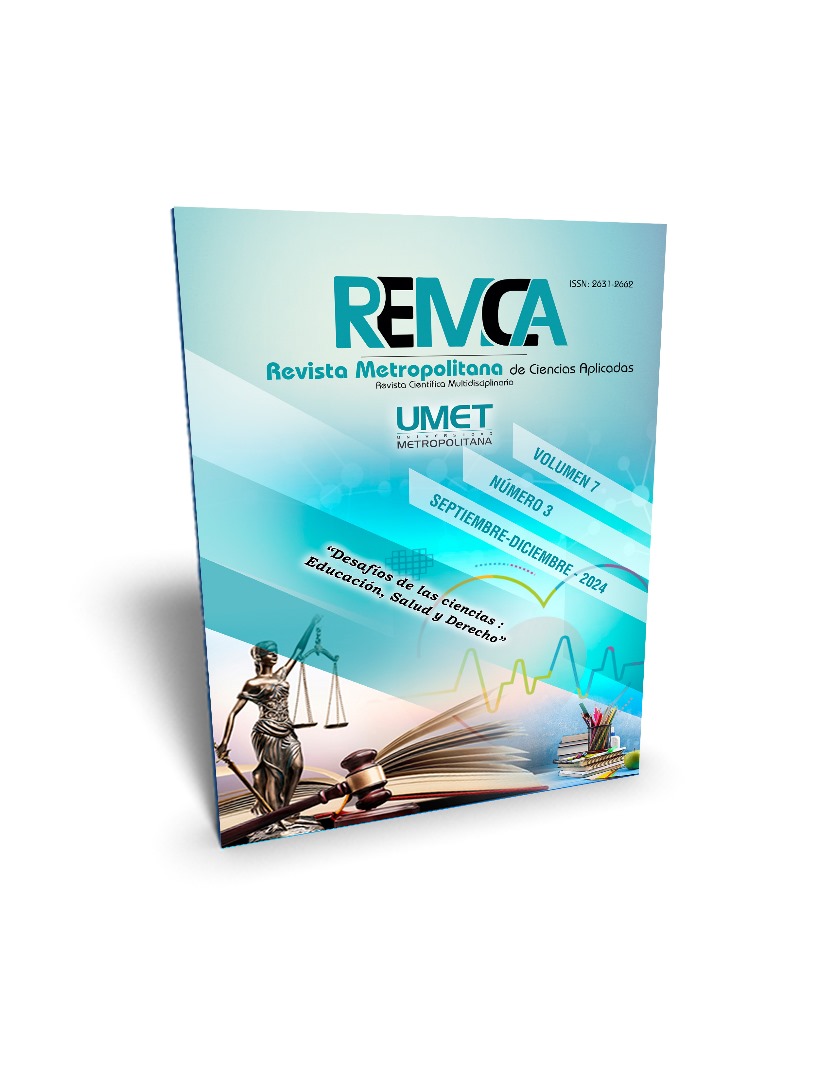La casación penal en Ecuador: su procedencia por falta de aplicación de la ley
DOI:
https://doi.org/10.62452/57dm5a58Keywords:
Criminal Cassation Appeal, lack of law enforcement, express contravention, Ecuadorian penal systemAbstract
The filing of the extraordinary appeal for criminal cassation, in Ecuador, based on the violation of the law in a sentence, means that the appellant must take into account any of the three components established in the law. However, when focusing on the ‘expressly contravening’ component, a diaspora of criteria arises to conceptualize or define it, coming from the legislator, doctrine, jurisprudence and comparative law, which makes it very difficult to decide when, in fact, the user of justice, is before the stated component. Then, with the application of the qualitative approach and following the theoretical legal, historical-logical, exegetical-analytical and comparative legal methods, the general objective is formulated: ‘Critically review the bases that lead to the legal formulation of article 656 of the Code Comprehensive Criminal Organic Law on the origin of the Cassation Appeal, specifically, regarding the first component of the violation of the law as “expressly contravening its text”, confronted with the principle of exhaustiveness and the jurisprudential line drawn by the National Court of Justice of the Ecuador, which, by stating that “… contravening the law is the same as its lack of application”. Arriving at the conclusion that, strictly speaking, the “express contravention” component is poorly formulated.
Downloads
References
Albán, E. (1994). La casación: estudios sobre la Ley Nº 27. Corporación Editora Nacional.
Calamandrei, P. (1945). La casación civil Tomo I Historia y Legislaciones Volumen I. Editorial Bibliográfica Argentina.
Canal Dazhbog. (2017). Giuseppe Moscati – El médico de los pobres. Youtube. https://www.youtube.com/watch?v=eh_6mqS1LIU
Canal Vinicio Rosillo. (2021). El recurso de casación. YouTube. https://www.youtube.com/watch?v=At5EOgOc5XM&t=2685s
Ecuador. Asamblea Nacional. (2014). Código Orgánico Integral Penal. Registro Oficial Nº 180. Ediciones legales EDLE S. A.
Ecuador. Corte Nacional de Justicia. (2014). Recurso de Casación – Resolución 410-2014, Sala Especializada de lo Penal, Penal Militar, Penal Policial y Tránsito. https://www.cortenacional.gob.ec/cnj/images/pdf/sentencias/sala_penal/2014/R410-2014-J1741-2013-HOMICIDIO-MY.pdf
Ecuador. Corte Nacional de Justicia. (2016). Recurso de Casación – Resolución 1837-2016, Sala Especializada de lo Penal, Penal Militar, Penal Policial y Tránsito. https://www.cortenacional.gob.ec/cnj/images/pdf/sentencias/sala_penal/2016-PDF/Octubre%20a%20Diciembre%202016/RESOL%20No.%201837-2016%20JUICIO%20No.%201008-2015.pdf
Ecuador. Corte Nacional de Justicia. (2021). Casación en materia penal. Jornadas académicas Corte Provincial de Justicia de Manabí. https://www.youtube.com/watch?v=nG8NSjNT02g
Ecuador. Corte Nacional de Justicia. (2021). El recurso de casación. https://www.youtube.com/watch?v=pQ3WLX6BXPY
Ecuador. Corte Nacional de Justicia. (2023). Sentencia de Casación Nº 19254-2019-00426 de fecha 1 de agosto del 2023, Sala Especializada de lo Penal, Penal Militar, Penal Policial, Tránsito, Corrupción y Crimen Organizado. https://procesosjudiciales.funcionjudicial.gob.ec/expel-juicios
Fernández, F. (2015). Un precedente remoto de la judicial Review: el control judicial de la legislación de las colonias americanas. Anuario Iberoamericano de Justicia Constitucional. https://www.cepc.gob.es/publicaciones/revistas/anuario-iberoamericano-de-justicia-constitucional/numero-19-enerodiciembre-2015/un-precedente-remoto-de-la-judicial-review-el-control-judicial-de-la-legislacion-de-las-colonias-1
Fundación Wikimedia. (2023). Wikipedia. https://es.wikipedia.org
Mayorga, F. (1954). La administración de justicia en el período colonial: Instituciones e instancias del derecho indiano. https://www.banrepcultural.org/biblioteca-virtual/credencial-historia/numero-136/la-administracion-de-justicia-en-el-periodo-colonial
Narváez, M. (2021). Estudio introductorio al recurso de casación en el COIP. Editora Jurídica Cevallos.
Velasco, J. (1789). Historia del Reino de Quito en la América Meridional/ Tomo II, Parte II. https://biblioteca.clacso.edu.ar/clacso/se/20191121024016/Historia_del_reino_de_Quito.pdf
Zapata, J. (2013). El recurso extraordinario de casación en el sistema latinoamericano. (Ponencia). I Seminario Internacional. Quito, Ecuador.
Downloads
Published
Issue
Section
License
Copyright (c) 2024 Luis Alfredo González-Dávila, Yudith López-Soria, Holger Geovanny García-Segarra (Autor/a)

This work is licensed under a Creative Commons Attribution-NonCommercial-ShareAlike 4.0 International License.
Authors who publish in Revista Metropolitana de Ciencias Aplicadas (REMCA), agree to the following terms:
1. Copyright
Authors retain unrestricted copyright to their work. Authors grant the journal the right of first publication. To this end, they assign the journal non-exclusive exploitation rights (reproduction, distribution, public communication, and transformation). Authors may enter into additional agreements for the non-exclusive distribution of the version of the work published in the journal, provided that acknowledgment of its initial publication in this journal is given.
© The authors.
2. License
The articles are published in the journal under the Creative Commons Attribution-NonCommercial-ShareAlike 4.0 International License (CC BY-NC-SA 4.0). The terms can be found at: https://creativecommons.org/licenses/by-nc-sa/4.0/deed.en
This license allows:
- Sharing: Copying and redistributing the material in any medium or format.
- Adapting: Remixing, transforming, and building upon the material.
Under the following terms:
- Attribution: You must give appropriate credit, provide a link to the license, and indicate if any changes were made. You may do this in any reasonable manner, but not in any way that suggests the licensor endorses or sponsors your use.
- NonCommercial: You may not use the material for commercial purposes.
- ShareAlike: If you remix, transform, or build upon the material, you must distribute your creation under the same license as the original work.
There are no additional restrictions. You may not apply legal terms or technological measures that legally restrict others from doing anything the license permits.




